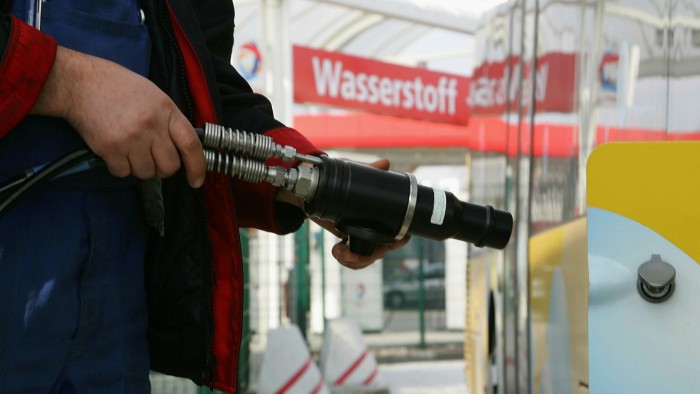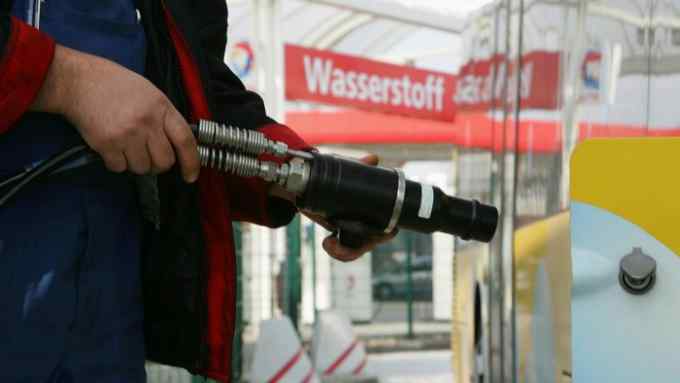Hydrogen takes a back seat to electric for passenger vehicles

Roula Khalaf, Editor of the FT, selects her favourite stories in this weekly newsletter.
Twenty years ago DaimlerChrysler revealed a “zero-litre car” — a hydrogen-powered Mercedes NECAR 5 that would help drive the industry out of the fossil fuel age and establish the Stuttgart-based carmaker as a “market leader in fuel cell technology”.
But in the decades since, fuel cell technology has made way for the battery-powered electric car — at least when it comes to passenger vehicles. In April, Daimler abandoned its remaining hydrogen car, instead concentrating its fuel cell efforts on a joint venture with Volvo to develop emissions-free trucks.
Rival Volkswagen, despite maintaining a small research arm in its Audi brand, has long argued that hydrogen technology is too complex and expensive.
Yet even as the country’s top carmakers reverse away from fuel cell car development, chancellor Angela Merkel’s government is intent on turning Germany into a hydrogen superpower.
In July, Berlin revealed its National Hydrogen Strategy, earmarking €9bn for investment in the technology, which transport minister Andreas Scheuer said would give the local automotive industry “fresh prospects for the future and help secure a great many jobs”.
The VDMA, which represents Germany’s mechanical engineering sector, says hydrogen investment offers the country — which lags many Asian economies when it comes to battery cell technology and solar expertise — a unique opportunity.
“We are still in pole position globally here and can map the entire value chain in Germany and Europe,” says Hartmut Rauen, the organisation’s deputy general manager.
Many of the family-owned Mittelstand groups that form the backbone of the German economy already have the necessary expertise for electrolysis and hydrogen storage, the VDMA says, but need solid commitments from the government to attract the necessary investment.
While hydrogen fuel cells can be used to power ships, trains and forklifts, as well as for industrial activities, the VDMA expects passenger cars to form the largest market.
A July study carried out for the VDMA suggested that global sales of hydrogen-powered vehicles will increase from 1m to more than 10m between 2030 and 2040.
But Germany’s homegrown car manufacturers show no sign of wanting a piece of that pie, and there are only 85 hydrogen fuelling stations in the country serving 750-odd hydrogen vehicles, according to McKinsey, a consultancy.
“We have a chicken and egg problem with hydrogen fuel cell technology,” says Axel Rücker, who runs BMW’s fuel cell department.
“As long as the network of refuelling stations for hydrogen-powered cars is so thin, the low demand from customers will not allow for profitable mass production of fuel cell vehicles,” he says.
“And as long as there are hardly any hydrogen cars on the roads, the operators will only hesitantly expand their refuelling station network.”
Opposition to hydrogen from within the carmaking sector remains strong.
“In passenger cars and light commercial vehicles, hydrogen cars are economic and ecological nonsense,” says Kurt Sigl, of the Federal Association for eMobility, BEM, whose members include some of Germany’s largest car part suppliers.
“In passenger transport, battery electric cars remain the right technology for the road to CO2-free mobility,” he adds.
The limited scope for further investment in the wake of the Covid-19 crisis has hardened auto executives’ opposition to the technology.
With VW alone spending €33bn on developing more than 70 battery electric models over the next few years, the industry — which is also investing in the rapid expansion of the charging infrastructure and battery cell production — can hardly afford to simultaneously develop hydrogen vehicles, the BEM argues.
“At the end we have to focus,” Markus Schäfer, chief operating officer of Mercedes-Benz, told a PwC conference in July. “What is the most efficient way to get green electricity to power a drivetrain?”
Faced with ever-stricter EU emissions regulations, and the prospect of large fines for failing to comply, carmakers claim they cannot afford to wait until hydrogen generation becomes more affordable, or more green.
“A hydrogen car requires energy from three or four times as many windmills than an electric vehicle needs for the same distance, making it three to four times as expensive to travel the same distance,” VW Group boss Herbert Diess told the PwC conference.
“That’s why more and more manufacturers are moving away from fuel cells.”
Ferdinand Dudenhöffer, the director of the Centre for Automotive Research in Duisburg, says that even the core argument for fuel cell cars — the ability to refuel within minutes rather than wait hours for a charge — was beginning to erode.
“In battery technologies, we see advancements that give them a longer life, which allows them to be recharged faster,” he says. Mr Dudenhöffer predicts that generating green hydrogen would remain too expensive to compete with the cost of running an electric car for many years to come.
Yet backers of hydrogen say cost parity is closer than imagined, especially for long-distance journeys.
“The ecosystem of hydrogen is much wider than just cars,” says Bernd Heid, an expert at McKinsey.
“The fuel cell won’t be developed for the passenger vehicle alone,” he adds, arguing that the cost of electrolysis will go down as hydrogen production is scaled up for trucks and industrial use.
An average truck would require a battery 10 times the size and the weight of that found in a standard Tesla car, Mr Heid says, making hydrogen the only viable, emissions-free alternative.
In the short term, however, Germany’s car manufacturers are unlikely to be persuaded to push fuel cells forward.
“If you have funding for only one technology,” Mr Heid says, “you cannot skip battery electric vehicles.”

Comments